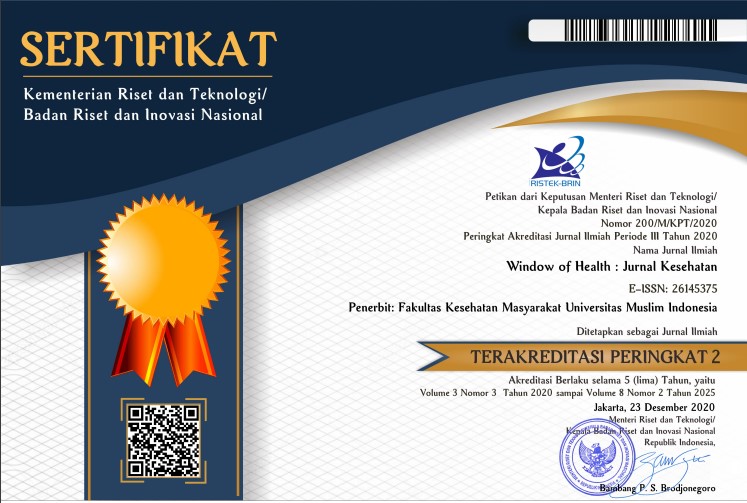Adolescents' Knowledge and Attitudes Toward Reproductive Health Using Website and Booklet Media
Abstract
Sexuality is considered a taboo topic by society, making it difficult to discuss openly. Parents typically provide minimal guidance, while teenagers frequently feel too embarrassed to ask questions. To overcome these barriers, a more engaging and accessible platform, such as a website dedicated to reproductive health, is necessary to help teenagers gain a better understanding of the topic. This study aims to analyze the influence of reproductive health education through website media on changes in adolescent knowledge and attitudes. This research is a quasi-experiment, a quantitative study. The research was conducted from March to November 2024. The respondents/subjects were 200 teenagers aged 15-18 years in Palangka Raya who owned a smartphone or laptop. The intervention group had an average knowledge score of 22.90, higher than the control group's score of 20.49. The Independent T-test showed a significance value of 0.000 (<0.05), indicating that education using the booklet was less effective in increasing knowledge compared to the website+booklet. Similarly, the intervention group's average attitude score was 127.67, higher than the control group's score of 122.08. The Independent T-test showed a significance value of 0.000 (<0.05), indicating that using only the booklet was less effective in improving attitudes compared to the combined website+booklet approach. Education on reproductive health delivered through a website and booklet is more effective at enhancing knowledge and attitude scores in adolescents than education provided solely through a booklet. Ensure that the digital platform is accessible to all adolescents, including those in remote areas.
References
WHO. Adolescent and young adult health. 22 April 2024. 2024;
WHO. Adolescent Sexual Reproductive Health. 2024;
BKKBN. Survei Kinerja dan Akuntabilitas Program KKBPK (SKAP) Remaja. Jakarta: 2019;
Widayati T, Ariestanti Y, Sulistyowati Y. Hubungan Tingkat Pengetahuan Kesehatan Reproduksi Remaja dengan Sikap Perilaku Seksual Pranikah di SMKN 24 Jakarta Tahun 2022. J Bid Ilmu Kesehat 2023;13(2):145–153.
Febriati LD, Zakiyah Z, Ratnaningsih E. Hubungan Dukungan Keluarga dengan Adaptasi Perubahan Psikologis Pada Ibu Nifas. J Kebidanan Indones 2023;14(2):48–54.
Usonwu I, Ahmad R, Curtis-Tyler K. Parent–adolescent communication on adolescent sexual and reproductive health in sub-Saharan Africa: a qualitative review and thematic synthesis. Reprod Health [homepage on the Internet] 2021;18(1):1–15. Available from: https://doi.org/10.1186/s12978-021-01246-0
Millenia ME, Ningsih Fitriani, Tambunan LN. Pengaruh Pendidikan Kesehatan terhadap Tingkat Pengetahuan Remaja tentang Bahaya Pernikahan Dini. J Surya Med 2022;7(2):57–61.
Malouf N El, Bahemia H. Diffusion of Innovations: A review. Educ Technol An Encycl 2023;1–2:205–210.
West M, Rice S, Vella-Brodrick D. Adolescent Social Media Use through a Self-Determination Theory Lens: A Systematic Scoping Review. Int J Environ Res Public Health 2024;21(7).
Paccoud I, Baumann M, Bihan E Le, et al. Socioeconomic and behavioural factors associated with access to and use of Personal Health Records. BMC Med Inform Decis Mak [homepage on the Internet] 2021;21(1):1–11. Available from: https://doi.org/10.1186/s12911-020-01383-9
Schulz W, Ainley J, Fraillon J, et al. Education for citizenship in times of global challenge: IEA International Civic and Citizenship Education Study 2022 International Report. Germany: 2022;
Sousa D de, Fogel A, Azevedo J, Padrão P. The Effectiveness of Web-Based Interventions to Promote Health Behaviour Change in Adolescents: A Systematic Review. Nutrients 2022;14(6):1–24.
Magis-Weinberg L, Ballonoff Suleiman A, Dahl RE. Context, Development, and Digital Media: Implications for Very Young Adolescents in LMICs. Front Psychol 2021;12(April):1–11.
Dowling R, Howell EM, Dasco MA, Schwartzman J. Digital Adolescent Sexual and Reproductive Health in Low- and Middle-Income Countries: A Scoping Review. Youth 2025;5(1):15.
Aguilar-Quesada A, Sierra-Yagüe A, González-Cano-Caballero M, Zafra-Egea JA, Lima-Serrano M. Effectiveness of digital interventions to reduce school-age adolescent sexual risks: A systematic review. J Nurs Scholarsh 2025;57(2):342–353.
Keum BTH, Wang YW, Callaway J, Abebe I, Cruz T, O’Connor S. Benefits and harms of social media use: A latent profile analysis of emerging adults. Curr Psychol [homepage on the Internet] 2023;42(27):23506–23518. Available from: https://doi.org/10.1007/s12144-022-03473-5
Guo R, Pan W, Zhao W, Zhao M, Wang J. Effectiveness of an online sexual and reproductive health educational program on knowledge, attitudes, and behaviours among senior primary school students: a cluster randomized controlled trial. Reprod Heal 2025;22(1).
Yoost J, Ruley M, Durfee L. Acceptability of a Comprehensive Sex Education Self-Study Website for Teaching Reproductive Health: A Pilot Study Among College Students and Obstetrics and Gynecology Resident Physicians. Sex Med 2021;9(1):100302.
Arifah I, Sharfina MF, Widowati MS. Reproductive Health Information Access of Health Faculty Students. 2020;24(Uphec 2019):7–12.
Jayaraman PP, Forkan ARM, Morshed A, Haghighi PD, Kang Y Bin. Healthcare 4.0: A review of frontiers in digital health. Wiley Interdiscip Rev Data Min Knowl Discov 2020;10(2):1–23.
Alruthaya A, Nguyen TT, Lokuge S. The Application of Digital Technology and the Learning Characteristics of Generation Z in Higher Education. ACIS 2021 - Australas Conf Inf Syst Proc 2021;1–7.
Zafar M, Khushi Q. Exploring Social and Cognitive skills of Students in Online Classes: A Case Study under Bandura’s Theory. Glob Lang Rev 2022;VII(II):367–381.
Lim MSC, Molenaar A, Brennan L, Reid M, McCaffrey T. Young Adults’ Use of Different Social Media Platforms for Health Information: Insights From Web-Based Conversations. J Med Internet Res 2022;24(1).
Scott RH, Smith C, Formby E, et al. What and how: doing good research with young people, digital intimacies, and relationships and sex education. Sex Educ 2020;20(6):675–691.
Fähnrich B, Weitkamp E, Kupper JF. Exploring ‘quality’ in science communication online: Expert thoughts on how to assess and promote science communication quality in digital media contexts. Public Underst Sci 2023;32(5):605–621.
Alyafei A E-CR. The Health Belief Model of Behavior Change. [Updated 2024 May 19]. In: StatPe. StatPearls Publishing, 2024;
Copyright (c) 2025 Seri Wahyuni, Wahidah Sukriani, Nursama Heru Apriantoro

This work is licensed under a Creative Commons Attribution-NonCommercial-ShareAlike 4.0 International License.








